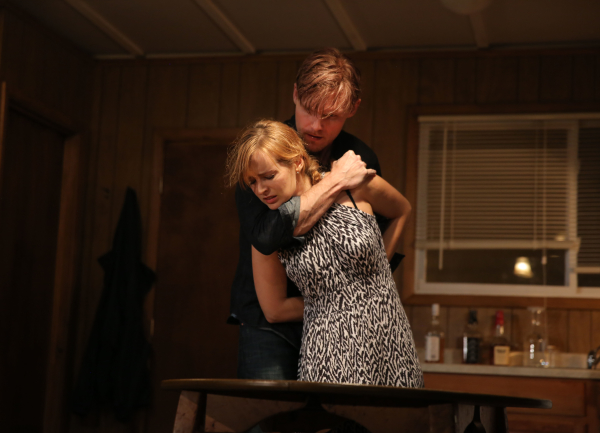The Long Shrift

(© Joan Marcus)
This show should probably come with a trigger warning (if such things are actually useful). Really, any play that gives an honest look at how the sometimes-ambiguous definition of rape can often shift depending on one's income is bound to conjure up a lot of bad feelings for victims and the accused alike. Robert Boswell's The Long Shrift, now receiving its world premiere at Rattlestick Playwrights Theater, is just such a play. You'll leave this show with a lot of unanswered questions. Unfortunately, they won't all be about the themes of this fascinating, but messy show.
The play opens with Henry (Brian Lally) and Sarah Singer (Ally Sheedy) moving into a crappy house outside of Houston. Their son, Richard (Scott Haze), has just been convicted of raping Lizzie DeVaughn (Ahna O'Reilly), the richest and most popular girl at Lancaster High School, where Richard was a student. The Singers had to sell their previous home to pay for his legal defense. While Henry steadfastly believes his son to be innocent, Sarah is not so sure. Yet when Lizzie (who now goes by Beth) recants her accusation five years into Richard's prison sentence, he is vindicated. On the eve of their 10-year high school reunion, Beth arrives at the Singers' home with something important to tell Richard. After all he's been through, however, he may not want to hear it.
Director James Franco has led every member of this cast to incredibly specific and emotionally honest performances. Haze's Richard is a DiCaprio-esque wisecracking ex-con, equal parts charming in his humor and repulsive in his cruelty. O'Reilly's Beth is a fallen rich girl accustomed to suffering silently, which she does through most of the play. Macy (Allie Gallerani), the show's comic relief, is a clueless 18-year-old stumbling through a very delicate situation and making it all about herself.
Andromache Chalfant's set is equally specific, even in its relative simplicity. Most of the action takes place in the Singers' sparsely furnished living room. A hollow-core door (more appropriate for a closet) serves as the front entry. It uncomfortably rubs up against cheap carpeting every time it is opened and closed. Frustratingly, you couldn't even slam this door if you wanted to, and all of these characters have plenty of reason to do that.
Yet for all of these carefully considered choices, there are some baffling oversights. For instance, why does Richard (born and raised in Texas) regularly lapse into a New York metropolitan accent possessed by neither of his parents? And why is this ex-con, who works at a carwash, wearing expensive Calvin Klein underwear? Taken with his unwashed blond hair, he looks more like the front man of a multiplatinum grunge band than an actual poor person. These cosmetic incongruities are never explained and might be excusable if there weren't so many holes in the larger story structure.
Sarah describes her Vietnam veteran husband as a macho alpha male, but there is little evidence of that in the ineffectual milquetoast we see onstage. Maybe Henry is compensating for the guilt he feels about his falsely accused son by being overly accommodating. But then, when Richard begs his father not to leave him alone in a room with Beth, Henry responds, "I hear you, and I love you, son…so I'm going." What? Perhaps the barrier to making this scene happen organically was so great that such awkward contrivance seemed absolutely necessary, but that doesn't make it any less weird. An abrupt ending feels similarly forced and falsely profound. A seasoned director is often able to smooth these moments out of a new play by suggesting smart rewrites to the author. Unfortunately it appears as though first-time director Franco, for all his considerable talent, did not.
All this roughness notwithstanding, The Long Shrift is still a thought-provoking and emotionally galvanizing play, sure to launch a thousand uncomfortable post-show discussions. Its ability to break away from the Oprahfied conventional narrative of victimization in a sensitive and intelligent way is more than reason enough to go see it.











